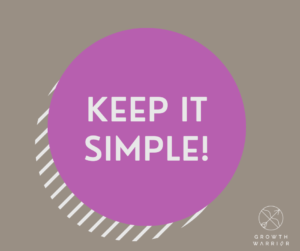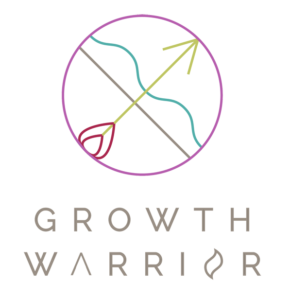When to Keep it Simple Sylvia . Suggestions for adapting to change.
* * * * *
What makes something powerful?
SIMPLICITY! In fact, the simpler the better. Getting straight to the point is one way to be effective. Stripping things back to their most basic fundamental aspects is another. Though making something simple is anything but, it can be a worthwhile endeavor when things get messy. After all, life is complicated.
So how can we manage through complexity?
In all my talk about adapting to and preparing for change, I don’t speak enough about how to deal with the impact of massive change. Truth be told, huge changes like moving, losing a job or loved one, having a health issue or any one of the top 10 stressors in life can be overwhelming and push us to a breaking point. And when multiple challenges converge upon us all at once it is even more disruptive.
This has happened in my own life when COVID hit, my Dad passed away, I lost a big job opportunity and then decided to move out to the country. While that last change was my choice, the others clearly were not. Having them all happen together in close proximity gave me a bit of whiplash, like the rug was pulled out from under me and I fell back on the floor, hit my head and was disoriented for a while.
I joke now about feeling like a fish out of water living in the country, but there was a lot of re-orienting required for an extended period of time as I tried to integrate all of those changes into a new way of being in the world. It was a real trial by fire of sorts. I experienced a lot of stress navigating the loss of my Dad and the aftermath as I know many had similar COVID-related experiences. I was fortunate to be with my father through the end, not separated from him by the inability to travel or all the pandemic precautions, though many were not as lucky.
On a regular basis I see my clients and students navigating so much uncertainty in their lives – from job losses to relationships ending and other personal and professional traumatic events. The advice I have tried to follow and that I share with others is…..
Be gentle with yourself!
Ironically this can seem so simplistic and yet so challenging to do. In our rush to push through, get our lives back on track and return to normalcy, we often exacerbate our stress unwittingly. Why? Because emotions and strong feelings that are not acknowledged have to go somewhere. In my case, they came out through my body. On multiple mornings my face turned red and inflamed in reaction to foods I had previously eaten without consequence. Food allergies were my insides rebelling and telling me to slow down, be more thoughtful and intentional in my choices.
Why do so many of us feel a need to be strong and soldier on or through whatever challenge we’re faced with? Because that’s our cultural norm. We are not taught to allow or acknowledge personally, let alone in community, our losses in a way that creates space for extended grief or not knowing. We fear that if we show weakness or vulnerability or start to fall apart that we’ll never be able to pick the pieces back up.
REST. RECHARGE. REGROUP.
While you may not need my permission to take a break or give yourself a break, I’m explicitly calling this out if you have experienced a big change recently. This is not a time to make more changes or big decisions in reaction to your situation that may be irreversible. Take time to work through what may be going on and give it and yourself some space to breathe. You may want to explore the following…
- What am I feeling? Let the emotions come out and through. Choose to acknowledge them rather than denying what you are going through.
- What am I avoiding? Are there issues that feel difficult or overwhelming to face? How might you address them in a way that feels safer or easier?
- How am I reacting? Notice any unhealthy choices (over-eating, exploding, withdrawing) you may be making. Can you slow down your responses to make different choices?
- How can I be more loving with myself? What do you really need to feel better? There is no shame in a good cry which can be incredibly cathartic. Do you need more down time? Can you go for a walk or do something kind for yourself or others?
- What support do you need? Do you have someone to speak with who will listen and create a safe space for you to be vulnerable? Sometimes our loved ones may also impacted and can’t be neutral, so independent resources can be less invested. Can you ask for help?
Be patient with the process!
In our desire to get on with it, we can try to rush back into normalcy as quickly as possible. Get through the rough patches, hurry up the healing, make everything fine and dandy. I don’t find that approach to be as helpful over the long run. Of course there’s a time and place for muscling through difficulties so you can get through to safety intact. Then I recommend making space for true recovery.
I can’t tell you exactly how long your healing and grieving or transition process will take. But think in terms of several months to a year or more, not a few weeks. It’s like the founders who used to be shocked when I told them it would take 12-24 months to gain traction in a new market when they hoped to be up, running and profitable in 6 months. While it’s not impossible, more than likely adapting to a major transition will take longer than you expect, so prepare to be patient.
SENDING YOU LOVE AND LIGHT!
When you find yourself feeling panicky and worried that you have to move ahead and make everything better, just know this is a normal desire AND you get to slow down and take care of yourself. I can guarantee that you will be far more productive and effective when you approach your life and work from a place of wholeness and grounding, rather than being overwhelmed and reactive. Life and change come in waves so know that this dip will be followed by a peak, even if you can’t see it right now. Rather than fight the current, try to relax and float a little so you can be supported.




